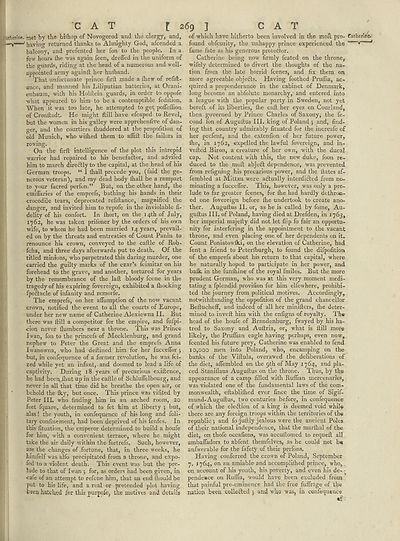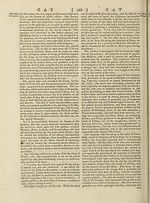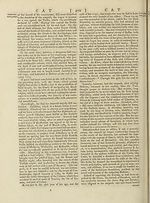Encyclopaedia Britannica, or, a Dictionary of arts, sciences, and miscellaneous literature : enlarged and improved. Illustrated with nearly six hundred engravings > Volume 5, BUR-CHI
(285) Page 269
Download files
Complete book:
Individual page:
Thumbnail gallery: Grid view | List view

CAT
t 269 ]
CAT
iltherine. met by tb« biibop of Novogorod and the clergy, and,
—y—' having returned thanks to Almighty God, afcended a
balcony, and prefented her fon to the people. In a
few hours {he was again feen, dreffed in the uniform of
the guards, riding at the head of a numerous and well-
appointed army againll; her hufband.
That unfortunate prince firit made a fhew of refift-
ance, and manned his Liliputian batteries, at Orani-
enbaum, with his Holftein guards, in order to oppofe
what appeared to him to be a contemptible fedition.
When it was too late, he attempted to get poiTeflion
of Croniladt. He might ftill have efcaped to Revel,
but the women in his galley v'ere apprehenfive of dan¬
ger, and the courtiers Ihuddered at the propofition of
old Munich, who wiihed them to aflilt the failors in
rowing.
On the firft intelligence of the plot this intrepid
warrior had repaired to his benefadlor, and advifed
him to march directly to the capital, at the head of his
German troops. “ I {hall precede you, (faid the ge¬
nerous veteran), and my dead body {hall be a rampart
to jour facred perfon.” But, on the other hand, the
emiflaries of the emprefs, bathing his hands in their
crocodile tears, deprecated refinance, magnified the
danger, and invited him to repofe in the inviolable fi¬
delity of his confort. In Ihort, on the 14th of July,
1762, he was taken pril’oner by the orders of his own
wife, to whom he had been married 14 years, prevail¬
ed on by the threats and entreaties of Count Panin to
renounce his crown, conveyed to the caftle of Rob-
fcha, and three days afterwards put to death. Of the
titled minions, who perpetrated this daring murder, one
carried the guilty marks of the czar’s fcimitar on his
forehead to the grave, and another, tortured for years
by the remembrance of the laft bloody fcene in the
tragedy of his expiring fovereign, exhibited a {hocking
fpeftacle of infanity and remorfe.
The emprefs, on her affumption of the now vacant
crown, notified the event to all the courts of Europe,
under her new name of Catherine Alexiewna II. But
there was {fill a competitor for the empire, and fufpi-
-cion never {lumbers near a throne. This was Prince
Iwan, fon to the princefs of Mecklenburg, and grand
nephew to Peter the Great and the emprefs Anna
Iwanowna, who had deftined him for her fucceffor j
but, in confequence of a former revolution, he was lei-
zed while yet an infant, and doomed to lead a life of
captivity. During 18 years of precarious exiftence,
he had been {hut up in the caftle of Schluffelbourg, and
never in all that time did he breathe the open air, or
behold the iky, but once. This prince was vifited by
Peter III. who finding him in an arched room, 20
feet fquare, determined to fet him at liberty 5 but,
alas! the youth, in confequence of his long and foli-
tary confinement, had been deprived of his fenfes. In
this fituation, the emperor determined to build a houfe
for him, with a convenient terrace, where he might
take the air daily within the fortrefs. Such, however,
are the changes of .fortune, that, in three weeks, he
himfelf was alfo precipitated from a throne, and expo-
fed to a violent death. This event was but the pre¬
lude to that of Iwan ; for, as orders had been given, in
cafe of an attempt to refeue him, that an end ftiould be
put to his life, and a real or pretended plot having
been hatched for this purpofc, the motives and details
of which have hitherto been involved in the moll pro- Catherine."
found obfeurity, the unhappy prince experienced the ,f
fame fate as his generous protector.
Catherine being now firmly feated on the throne,
wifely determined to divert the thoughts of the na¬
tion from the late horrid feenes, and fix them on
more agreeable objefts. Having foothed Pruflia, ac¬
quired a preponderance in the cabinet of Denmark,
long become an abfolute monarchy, and entered into
a league with the popular party in Sweden, not yet
bereft of its liberties, the cafi her eyes on Courland,
then governed by Prince Charles of Saxony, the fe¬
cund Ion of Auguftus III. king of Poland j and, find¬
ing that country admirably fituated for the increafe of
her prefent, and the extenfion of her future power,
{he, in 1762, expelled the lawful fovereign, and in-
vefted Biron, a creature of her own, v'ith the ducal
cap. Not content with this, the new duke, loon re¬
duced to the moft abjedl dependence, was prevented
from refigning his precarious power, and the ftates af-
fembled at Mittau were actually interdicted from no¬
minating a fucceffor. This, however, was only a pre¬
lude to far greater feenes, for Are had hardly dethron¬
ed one fovereign before Are undertook to create ano¬
ther. Auguftus II. or, as he is called by fome, Au¬
guftus III. of Poland, having died at Drefden, in 1763,
her imperial majefty did not let flip fo fair an opportu¬
nity for interfering in the appointment to the vacant
throne, and even placing one of her dependents on it.
Count Poniatowlki, on the elevation of Catherine, had
fent a friend to Peterlburgh, to found the difpofition
of the emprefs about his return to that capital, where
he naturally hoped to participate in her power, and
balk in the funftiine of the royal fmiles. But the more
prudent German, who was at this very moment medi¬
tating a fplendid provifion for him elfewhere, prohibi¬
ted the journey from political motives. Accordingly,
notwithftanding the oppofition of the grand chancellor
Beftucheff, and indeed of all her minifters, Ihe deter¬
mined to inveft him with the enfigns of royalty. The
head of the houfe of Brandenburg, fwayed by his ha¬
tred to Saxony and Auftria, or, what is ftill more
likely, the Pruflian eagle having perhaps, even now,
feented his future prey, Catherine was enabled to fend
10,000 men into Poland, who, encamping on the
banks of the Viftula, overawed the deliberations of
the diet, affembled on the 9th of May 1764, and pla¬
ced Staniflaus Auguftus on the throne. Thus, by the
appearance of a camp filled writh Ruffian mercenaries,
was violated one of the fundamental laws of the com¬
monwealth, eftabliffied ever fince the time of Sigif-
mund-Auguftus, two centuries before, in confequence
of which the election of a king is deemed void whilf
there are any foreign troops within the territories of the
republic 5 and fo juftly jealous were the ancient Poles
of their national independence, that the marlhal of the
diet, on thofe occafions, was accuftomed to requeft all
ambaffadors to abfent themfelves, as he could not be
anfwerable for the fafety of their pprfons.
Having conferred the crown of Poland, September
7. 1764, on an amiable and accompliftied prince, who,
on account of his youth, his poverty, and even his de- -
pendeace on Ruffia, would have been excluded from
that painful pre-eminence had the free fuffrage of the
nation been collected j and who was, in confequence
«£' •
t 269 ]
CAT
iltherine. met by tb« biibop of Novogorod and the clergy, and,
—y—' having returned thanks to Almighty God, afcended a
balcony, and prefented her fon to the people. In a
few hours {he was again feen, dreffed in the uniform of
the guards, riding at the head of a numerous and well-
appointed army againll; her hufband.
That unfortunate prince firit made a fhew of refift-
ance, and manned his Liliputian batteries, at Orani-
enbaum, with his Holftein guards, in order to oppofe
what appeared to him to be a contemptible fedition.
When it was too late, he attempted to get poiTeflion
of Croniladt. He might ftill have efcaped to Revel,
but the women in his galley v'ere apprehenfive of dan¬
ger, and the courtiers Ihuddered at the propofition of
old Munich, who wiihed them to aflilt the failors in
rowing.
On the firft intelligence of the plot this intrepid
warrior had repaired to his benefadlor, and advifed
him to march directly to the capital, at the head of his
German troops. “ I {hall precede you, (faid the ge¬
nerous veteran), and my dead body {hall be a rampart
to jour facred perfon.” But, on the other hand, the
emiflaries of the emprefs, bathing his hands in their
crocodile tears, deprecated refinance, magnified the
danger, and invited him to repofe in the inviolable fi¬
delity of his confort. In Ihort, on the 14th of July,
1762, he was taken pril’oner by the orders of his own
wife, to whom he had been married 14 years, prevail¬
ed on by the threats and entreaties of Count Panin to
renounce his crown, conveyed to the caftle of Rob-
fcha, and three days afterwards put to death. Of the
titled minions, who perpetrated this daring murder, one
carried the guilty marks of the czar’s fcimitar on his
forehead to the grave, and another, tortured for years
by the remembrance of the laft bloody fcene in the
tragedy of his expiring fovereign, exhibited a {hocking
fpeftacle of infanity and remorfe.
The emprefs, on her affumption of the now vacant
crown, notified the event to all the courts of Europe,
under her new name of Catherine Alexiewna II. But
there was {fill a competitor for the empire, and fufpi-
-cion never {lumbers near a throne. This was Prince
Iwan, fon to the princefs of Mecklenburg, and grand
nephew to Peter the Great and the emprefs Anna
Iwanowna, who had deftined him for her fucceffor j
but, in confequence of a former revolution, he was lei-
zed while yet an infant, and doomed to lead a life of
captivity. During 18 years of precarious exiftence,
he had been {hut up in the caftle of Schluffelbourg, and
never in all that time did he breathe the open air, or
behold the iky, but once. This prince was vifited by
Peter III. who finding him in an arched room, 20
feet fquare, determined to fet him at liberty 5 but,
alas! the youth, in confequence of his long and foli-
tary confinement, had been deprived of his fenfes. In
this fituation, the emperor determined to build a houfe
for him, with a convenient terrace, where he might
take the air daily within the fortrefs. Such, however,
are the changes of .fortune, that, in three weeks, he
himfelf was alfo precipitated from a throne, and expo-
fed to a violent death. This event was but the pre¬
lude to that of Iwan ; for, as orders had been given, in
cafe of an attempt to refeue him, that an end ftiould be
put to his life, and a real or pretended plot having
been hatched for this purpofc, the motives and details
of which have hitherto been involved in the moll pro- Catherine."
found obfeurity, the unhappy prince experienced the ,f
fame fate as his generous protector.
Catherine being now firmly feated on the throne,
wifely determined to divert the thoughts of the na¬
tion from the late horrid feenes, and fix them on
more agreeable objefts. Having foothed Pruflia, ac¬
quired a preponderance in the cabinet of Denmark,
long become an abfolute monarchy, and entered into
a league with the popular party in Sweden, not yet
bereft of its liberties, the cafi her eyes on Courland,
then governed by Prince Charles of Saxony, the fe¬
cund Ion of Auguftus III. king of Poland j and, find¬
ing that country admirably fituated for the increafe of
her prefent, and the extenfion of her future power,
{he, in 1762, expelled the lawful fovereign, and in-
vefted Biron, a creature of her own, v'ith the ducal
cap. Not content with this, the new duke, loon re¬
duced to the moft abjedl dependence, was prevented
from refigning his precarious power, and the ftates af-
fembled at Mittau were actually interdicted from no¬
minating a fucceffor. This, however, was only a pre¬
lude to far greater feenes, for Are had hardly dethron¬
ed one fovereign before Are undertook to create ano¬
ther. Auguftus II. or, as he is called by fome, Au¬
guftus III. of Poland, having died at Drefden, in 1763,
her imperial majefty did not let flip fo fair an opportu¬
nity for interfering in the appointment to the vacant
throne, and even placing one of her dependents on it.
Count Poniatowlki, on the elevation of Catherine, had
fent a friend to Peterlburgh, to found the difpofition
of the emprefs about his return to that capital, where
he naturally hoped to participate in her power, and
balk in the funftiine of the royal fmiles. But the more
prudent German, who was at this very moment medi¬
tating a fplendid provifion for him elfewhere, prohibi¬
ted the journey from political motives. Accordingly,
notwithftanding the oppofition of the grand chancellor
Beftucheff, and indeed of all her minifters, Ihe deter¬
mined to inveft him with the enfigns of royalty. The
head of the houfe of Brandenburg, fwayed by his ha¬
tred to Saxony and Auftria, or, what is ftill more
likely, the Pruflian eagle having perhaps, even now,
feented his future prey, Catherine was enabled to fend
10,000 men into Poland, who, encamping on the
banks of the Viftula, overawed the deliberations of
the diet, affembled on the 9th of May 1764, and pla¬
ced Staniflaus Auguftus on the throne. Thus, by the
appearance of a camp filled writh Ruffian mercenaries,
was violated one of the fundamental laws of the com¬
monwealth, eftabliffied ever fince the time of Sigif-
mund-Auguftus, two centuries before, in confequence
of which the election of a king is deemed void whilf
there are any foreign troops within the territories of the
republic 5 and fo juftly jealous were the ancient Poles
of their national independence, that the marlhal of the
diet, on thofe occafions, was accuftomed to requeft all
ambaffadors to abfent themfelves, as he could not be
anfwerable for the fafety of their pprfons.
Having conferred the crown of Poland, September
7. 1764, on an amiable and accompliftied prince, who,
on account of his youth, his poverty, and even his de- -
pendeace on Ruffia, would have been excluded from
that painful pre-eminence had the free fuffrage of the
nation been collected j and who was, in confequence
«£' •
Set display mode to:
![]() Universal Viewer |
Universal Viewer | ![]() Mirador |
Large image | Transcription
Mirador |
Large image | Transcription
Images and transcriptions on this page, including medium image downloads, may be used under the Creative Commons Attribution 4.0 International Licence unless otherwise stated. ![]()
| Permanent URL | https://digital.nls.uk/192987974 |
|---|
| Attribution and copyright: |
|
|---|
| Description | Ten editions of 'Encyclopaedia Britannica', issued from 1768-1903, in 231 volumes. Originally issued in 100 weekly parts (3 volumes) between 1768 and 1771 by publishers: Colin Macfarquhar and Andrew Bell (Edinburgh); editor: William Smellie: engraver: Andrew Bell. Expanded editions in the 19th century featured more volumes and contributions from leading experts in their fields. Managed and published in Edinburgh up to the 9th edition (25 volumes, from 1875-1889); the 10th edition (1902-1903) re-issued the 9th edition, with 11 supplementary volumes. |
|---|---|
| Additional NLS resources: |
|

